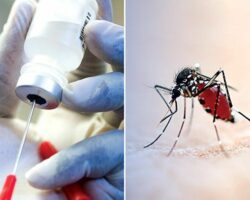According to scientists, a new malaria vaccine will ‘change the world’

Scientists at the University of Oxford have created a malaria vaccine that has the potential to ‘world-changing’.
After tests revealed up to 80% protection against the fatal disease, the team anticipates it will be implemented next year.
Importantly, according to the researchers, their vaccine is affordable, and they already have a contract to produce more than 100 million doses annually.
Malaria No More, a charity, stated that because to latest innovations, malaria deaths among children may be eliminated “in our lifetimes.”
Due to the malaria parasite’s extraordinary complexity and elusiveness, which is spread by mosquitoes, it has taken more than a century to develop effective vaccines. It is challenging to develop an immunity to because it is a dynamic target that changes forms inside the body.
The World Health Organization gave the first vaccination, created by pharmaceutical behemoth GSK, the historic go-ahead to be deployed in Africa last year.
The Oxford team asserts that their method is superior and can be produced on a far larger scale.
The Lancet Infectious Diseases has released the trial findings from 409 kids in Nanoro, Burkina Faso. It demonstrates that three initial doses plus a booster shot given a year later can provide up to 80% protection.
Prof. Adrian Hill, director of the university’s Jenner Institute, stated, “We think these data are the best data yet in the field with any malaria vaccine.”
In the coming weeks, the team will begin the process of getting their vaccine licenced, but the ultimate decision will depend on the outcomes of a larger experiment including 4,800 kids that is due by the end of the year.
The Serum Institute of India, the biggest vaccine producer in the world, has already committed to producing more than 100 million doses annually.
The vaccine, known as R21, may be produced for “a few dollars,” according to Prof. Hill, and “we really could be looking at a very substantial reduction in that horrendous burden of malaria.”
We hope that this will be deployed, accessible, and saving lives by the end of next year, he continued.
Since ancient times, malaria has been one of the worst scourges on humanity, primarily taking the lives of newborns and children. Even after significant advancements with bed nets, insecticides, and medications, the disease still claims the lives of over 400,000 people annually.
Prof. Katie Ewer has been working on a vaccine for malaria for the past 14 years at Oxford because “this is not like Covid where we have seven vaccines straight away that will work… it’s much, much harder.”
She told the BBC it was “incredibly gratifying” to reach this far and “the potential achievement that this vaccine may have if it’s rolled out could be genuinely world-changing”.
Why is it so powerful?
The GSK vaccine that has been given official approval is similar to the Oxford vaccination.
Both aim to stop the parasite in its tracks at the beginning of its lifecycle, before it reaches the liver and gains a stronghold in the host.
The vaccines are made using a combination of proteins from the malaria parasite and the hepatitis B virus, although Oxford’s version has a higher proportion of malaria proteins. The research team believes that this aids the immune system in concentrating on malaria rather than hepatitis.
By determining how viable a vaccination campaign in Africa would be, for example, Oxford is optimistic that their vaccine will be available next year thanks in part to the success of the GSK vaccine.
Giving a clear comparison of the two vaccines is challenging. Given right before Burkina Faso’s peak malaria season, Oxford’s findings may appear more successful than GSK’s, which has undergone extensive real-world trials.
Although the trial results were “very welcome,” Prof. Azra Ghani, chair in infectious disease epidemiology at Imperial College London, cautioned that it would cost money to get vaccines into the hands of patients.
Without this investment, Prof. Ghani said, “we risk losing the gains that have been made over the last decades and witnessing a rising tide of malaria resurgence.”
“Today’s R21 vaccine results from Oxford’s renowned Jenner Institute are another encouraging signal that, with the right support, the world could end child deaths from malaria in our lifetimes,” said Gareth Jenkins of the charity Malaria No More UK.


